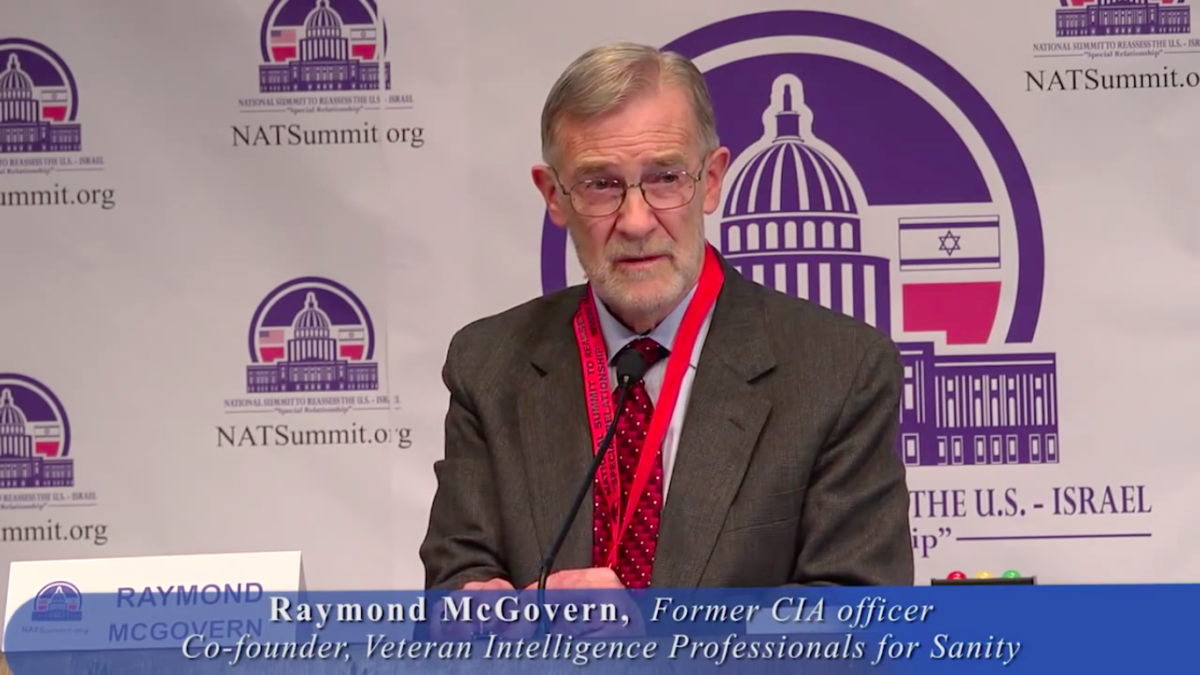
Ray Commentary, September 16, 2019
In the past, Israel has said “No Thanks” to such a mutual defense treaty, and Ray had an unusual chance to try to explain Israel’s attitude during a speech at the National Press Club five years ago.*** (See below.)
Agreeing with Ray’s take on things is not something top Israeli intelligence officials are accustomed to doing, so it seemed odd, at first, to hear the former chief of Israeli military intelligence publicly express views virtually identical to those expressed by Ray at the National Press Club. Israel’s attitude? So who needs a treaty? The “special” Israel-U.S. relationship brings us Israelis more one-sided advantages than we can count. The text of the latest article on this subject follows, with the link at the end.
Former IDF Intelligence Chief on US-Israel Defense Treaty: Security Establishment Has Always Decided ‘Disadvantages Outweigh Advantages’
By Benjamin Kerstein, September 15, 2019
A former chief of Israeli military intelligence said on Sunday that the idea of a mutual defense treaty between Israel and the United States has been considered before, but the Israeli security establishment has always rejected it.
Speaking to Israeli news website Mako, Amos Yadlin made the remarks in response to President Donald Trump and Prime Minister Benjamin Netanyahu’s recent discussions of a possible defense treaty. When the issue arose in the past the military and security services repeatedly concluded that the “disadvantages outweighed the advantages,” he said.
The most important misgiving, said Yadlin, is that Israel “could lose its freedom of action and be unable to decide alone on certain activities. If we wanted to go to war or a major operation, we would have to do it in consultation with the US.”
In what appeared to be reference to Israel’s refusal to acknowledge whether or not it has nuclear weapons, Yadlin added, “The loss of ambiguity is also significant.”
Asked whether there would also be advantages to a defense agreement, Yadlin answered, “The major advantage of a defense treaty is the strengthening of deterrence. If a state or terror organization seeks to attack Israel, it would understand that this would involve a war with the US.”
However, he noted, because of “the special relationship between Israel and the US, the deterrence is already strong. There are strategic collaborations between the countries that contribute to deterrence, and the question is if a defense treaty will actually strengthen deterrence or if it will remain as it is.”
In addition, Yadlin said, there would be serious obligations to the US placed on Israel.
“If the United States requests aid, then Israel is obligated to come to its aid, and of course the reverse,” he explained. “It’s like a rental contract, you have to live up to it and pay the landlord, and we know that not everyone pays all the time.”
“It’s a contract with heavy obligations,” he asserted.
Referring to whether the US would even send troops to disputed areas such as the West Bank, Yadlin explained, “One of the problems is that Israel does not have permanent borders, and the US has not recognized the territories as part of Israel. It has recognized western Jerusalem, and the rest of the city is up for negotiation.”
“So the situation is extremely complicated, but at the fundamental level, [the US] is supposed to send [troops] if Israel requests it,” he said.
However, Yadlin said, “If Trump and Netanyahu succeed in reaching an agreement in a unique format that meets our limitations, it could be worth it. If the agreement isn’t directed toward all the Middle East states, but only, for example, toward Iran, then it could be that this is a process worth considering.”
“But in the end, a classic defense agreement is a process that is not recommended for Israel,” he concluded.
***https://www.algemeiner.com/2019/09/15/former-idf-intelligence-chief-on-us-israel-defense-treaty-security-establishment-has-always-decided-disadvantages-outweigh-advantages/?utm_content=news1&utm_medium=daily_email&utm_campaign=email&utm_source=internal/
Ray’s comment:
These things — as important as they are — are not really hard to figure out. Ray addressed them head-on, in a light tone, during a 19-minute talk at the National Press Club on March 7, 2014 at the “National Summit to Reassess the U.S.-Israel ‘Special Relationship.’” (See: https://www.youtube.com/watch?v=-r97vxvl-MI .)
Several years before, during an unusual briefing orchestrated by House Judiciary Chair John Conyers on June 16, 2005, Ray had already ruffled feathers by suggesting that, since there is no U.S.-Israel mutual defense treaty, we all ought to stop calling Israel an “ally.”
For a one-page retrospective 13 years after Ray’s National Press Club speech, including two instructive links, please go to “The Truth About Oil, Israel, and the Iraq War”
https://raymcgovern.com/2018/05/21/the-truth-about-oil-israel-the-iraq-war-15-years-later/ .
Or you can go straight to the C-span video.
https://www.c-span.org/video/?187209-1/downing-street-minutes-pre-war-intelligence.
As indicated in the text of the retrospective mentioned above, the remarks Ray made at the Conyers briefing on Israel (plus oil and logistics) as drivers for the attack on Iraq are heard between hour/minute 1:43 and 1:46.
